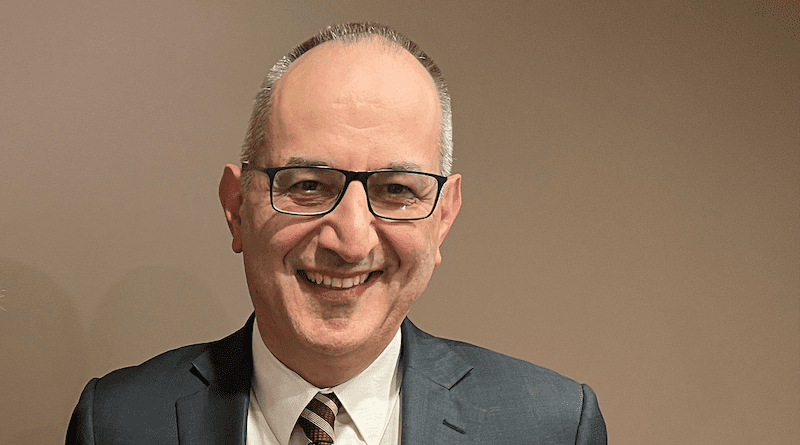Pezzullo: The Warmonger Who Won’t Go Away – OpEd
The compromised former top boss of the Australian civil service has the lick and smell of belligerence. Begrudgingly conceding error and when in office, a bully and meddler in party politics, an incessant advocate of threats visible and invisible, Mike Pezzullo switches into a warmonger’s gear with ease.
The former secretary of the Department of Home Affairs was sacked last November after revelations that he had used WhatsApp to communicate with abandon with former New South Wales Liberal Party deputy director Scott Briggs. Those messages, unearthed in a joint investigation by The Age, The Sydney Morning Herald and 60 Minutes, confirmed what many already knew: Pezzullo’s voracious appetite for meddling in the party politics of the Coalition government while denigrating fellow public servants and a number of politicians.
In August 2018, for instance, Pezzullo offered Briggs his gamey views ahead of the Liberal Party revolt that would see the overthrow of Prime Minister Malcolm Turnbull. “I don’t want to interfere but you won’t be surprised to hear that in the event of Scomo [Scott Morrison] getting up I would like to see [Peter] Dutton come back to HA [Home Affairs]. No reason for him to stay on the backbench that I can see.”
An inquiry into his conduct led by Lynelle Briggs found Pezzullo in breach of the Public Service Code of Conduct on various grounds. 14 breaches were identified from five broader allegations, including failures to maintain confidentiality regarding sensitive government information, maintain an apolitical stance, and disclosing a conflict of interest. Most fundamentally, he had misused his offence and standing to benefit or advantage himself.
Last month heralded his return to the public arena, tinged by a sense of desperation that he wants to be taken seriously again. On the ABC’s 7.30 program, he admitted to making “mistakes” and accepted “the finding that no matter how rough and tumble there is in a place like Canberra, that the gaining of influence and the personal advantage to be gained by way of certain channels of communication, whether it’s to the prime minister or anyone else, crosses the line in terms of conduct.” Showing the mildest contrition, Pezzullo claimed he had “paid a price.” Hardly.
With such preliminaries out of the way, he could return to one of his favourite passtimes: warning about the Yellow-Red threat emanating from Australia’s north. He accepted that the prospect of a war with China was “actually quite low [but] the consequences would be significant and indeed catastrophic.” A meaningless percentage of such an eventuality was plucked out of thin air: 10 per cent. Notwithstanding that statistic of potential conflict, it was “meaningful enough to plan for and indeed to be concerned about.”
Focus, he insisted, should be directed to the dangers of cyber and cognitive warfare. Cyber and critical infrastructure were “vulnerable” to malware threats that could burgeon in the event of a conflict. Concerns held by FBI director Christopher Wray were cited (unsurprising – Pezzullo habitually fawns before the US national security state): “that there is malware implanted in both US and allied networks, which is specifically designed to be activated in the lead up to or in the at the outset of a conflict.”
Dusted off, this Manchurian candidate vision of the world, with its hibernating potency, has been repurposed as a threat against the critical infrastructure. “Director Wray has talked about the low blows that would be visited on the population at large … taking down hospitals, electricity grids, and the like.”
Close attention should be paid to the disfiguring way Pezzullo uses history. When he was Canberra’s most powerful (un)civil servant, he liberally offered gobbets of historical readings that were hopelessly out of context. Pezzulo has that charming sub-literate Wikipedia knowledge of the world that makes him tolerable in the company of other sub-literates. As Home Secretary, he was not shy in spouting febrile nonsense about such topics as, “The prospect of Great Power War” that he claimed would “approach, but not reach, a level of probability”, or the use of chemical, biological, radiological or nuclear weapons by actors that were not “readily identifiable”.
Such views were expressed an address to the Australian Strategic Policy Institute in 2019, alongside those fears that have become boringly recycled for endless consumption: “the deliberate subversion of our democratic institutions and our social cohesion”; “the world’s ungoverned and dangerous territories”; “radical extremist Islamist terrorism”; and “transnational, serious and organised crime” of the “globalised” variety.
His 2021 ANZAC Day address made no secret of his lust for conflict, masquerading, as ever, under the cover of peaceful intentions. “Today, as free nations again hear the beating drums and watch worryingly the militarisation of issues that we had, until recent years, thought unlikely to be catalysts for war, let us continue to search unceasingly for the chance for peace while bracing again, yet again, for the curse of war”. The speech was notable for mangling the legacies of two US generals: Douglas MacArthur and Dwight D. Eisenhower. Fascinatingly enough, Pezzullo omits mentioning the sacking of MacArthur by President Henry S. Truman for exceeding his brief in wishing to bomb China during the Korean War, with atomic weapons, if need be.
As long as Sinophobic nonsense growls and barks in Canberra, most of it under the close, cultivating eyes of US-funded think tanks, political converts to empire and the Pentagon itself, this demagogic eunuch will have an audience.

